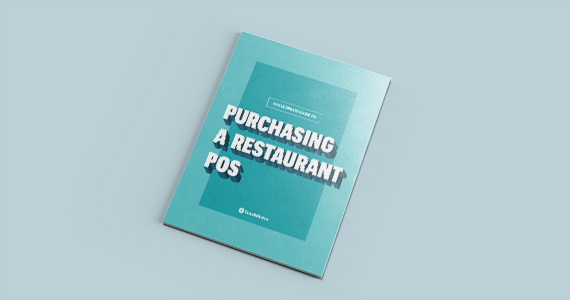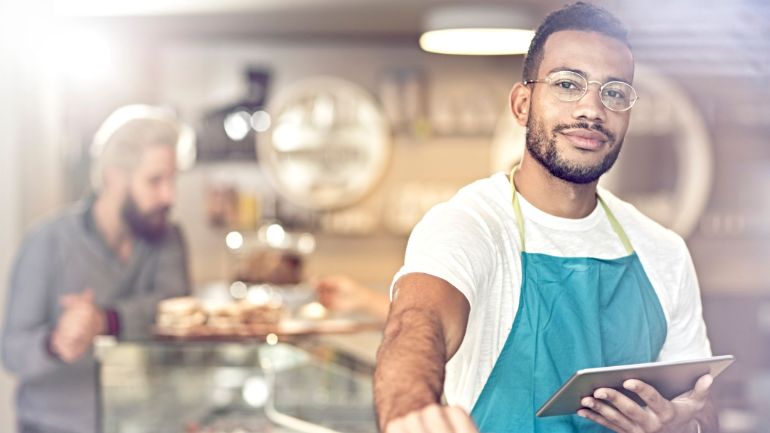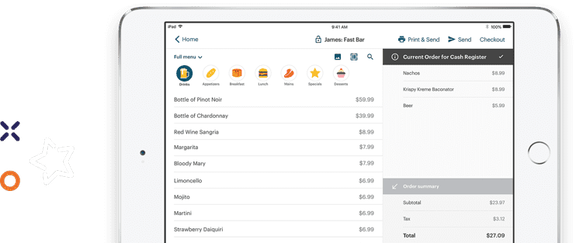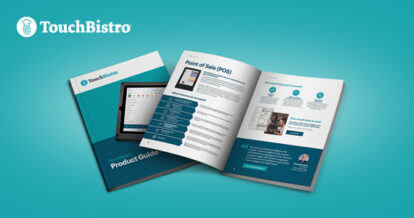Any new tech is all fun and games… until it comes to the set up.
We’ve been there, whether it’s a new phone, software, or anything in between. You start it up, hit the main menu, and… you’re stuck.
Getting your new restaurant POS system set up doesn’t have to be another one of those moments. With companies offering onsite and remote training options, you get to skip awkwardly fumbling through setup.
But which type of training do you actually need?
Great question! We’ll go over:
- The difference between on-site and remote training
- How to determine what you need for your business
- The most common objections to not having an on-site set up
Time to get some training on, well, training.

Get the guide that helps you evaluate different POS solutions and find the right one for your business.
On-Site vs. Remote Training: A Setup Showdown
Choosing a restaurant POS system is just half of it. The other (arguably, more important!) part is getting it up and running. The excitement of checking another thing off your to-do list can be quickly replaced with the looming fear of set up. But it doesn’t have to be!
Ask early and ask often about the training and onboarding process when choosing your POS. With the right team, training can seem easy and natural.
The different types of training available to you should be explained while shopping for a POS. Typically, the main methods of training offered are on-site training and remote training.
On-Site Training
As the title suggests, on-site training involves somebody coming to your restaurant and walking you through the set up.
Pro tip: On-site training typically means they’re at the venue working on your point of sale set-up exclusively. You’ll get help plugging in your system, and getting it up and running. If you need help with getting extra wiring set-up, router issues, or other set-up issues, these won’t be done through this type of on-site visit.
Pros:
- Face-to-face discussions with a trainer can help ease you into a new system.
- You get real-time practice with somebody right there to answer questions and support your learning.
Cons:
- It’s easy to get complacent when somebody else is setting up your system. You may not have the opportunity to get really hands-on and comfortable addressing minor issues on your own.
- The cost of on-site training adds up quickly.
- Scheduling an in-person visit can take longer and be more complicated than a phone call.
- If you need numerous people present, it can end up a scheduling nightmare
Remote Training
Remote training is when the person learning and the person teaching are not in the same physical location. Information is relayed through technology – such as phone calls, email, or webinars.
In the case of remote training for setting up your restaurant POS system, someone helps you get your system set up over the phone. The trainer will guide you through the same steps as if they’re at the venue with you, so your system gets up and running.
Typically, the person training your team can also patch into their system remotely. This means while you have somebody talking you through the system on the phone, you also have somebody who is able to control your exact system, not just a demo. If you’re ever stuck, they’re able to take over and show you exactly how to use the program.
Pros:
- Save money because a trainer doesn’t have to travel out to you.
- Get greater flexible with a phone call – if something comes up, you can reschedule a call easier than getting a person back out to your business.
- Resources – such as webinar recordings or training emails – are easy to keep and access again if needed. Just search your inbox!
- There’s no pressure to get your whole team in one spot at the same time for training. People can dial in from other locations or you can have your training recorded, so you can listen to it later or give it to new staff members.
Cons:
- You don’t have the comfort of someone physically walking you through the setup.
- Training may require more self-motivation.

What Do I Need?
It’s clear both options have their pros and cons. But what do you need for your business?
While it may be easy to fall into the comfort of bringing someone in to do it for you, take time to evaluate your business and personal experience before adding an extra expense to your budget.
Ask yourself these questions to see if you can go with remote training:
1) How big is your restaurant?
You just opened up the perfect little coffee shop in the heart of your neighborhood. Open concept, a few tables for people to sit, and you’re already building up a base of weekday regulars! This also means your POS installation is limited to one station. While you should be able to set up a system of any size with remote training, a smaller sized venue means you definitely can handle setup over the phone. In more complex venues, some POS providers offer free wiring consultations to give you guidance in setting up. All you have to do is provide your floor plan, and they can offer you
2) Are you comfortable with technology?
Picking up the latest iPad model and working through the cool new features feels natural to you and you’re a pro at fixing the finicky printer in the back office. If this is the case, your POS setup will likely be something you can handle with remote support. Remember: Your POS system is designed to be simple and intuitive – and you’re already a natural. With phone support, setting up your restaurant POS system will be a breeze.
3) Do you have previous restaurant experience?
Chances are, with previous experience in the industry, you’ll have been exposed to other restaurant POS systems, how they’re set up, and some of the best practices when choosing where to place your hardware. You already know not to set up near the swinging doors into the kitchen and to minimize wiring behind the bar – don’t pay big bucks for somebody to come tell you what you already know!
But don’t let any of this deter you! Even if the only experience you have at a restaurant is as a diner before starting your business, remote set-up with the right team will still be easy. Since remote training means your trainer isn’t directly beside you, it’s even more crucial training is clear and easy for you as it’s over a computer and phone!

“I Object!” – The Top Objections to Remote Training
Even if you were born in a kitchen and are a tech whiz, there’s still some common concerns that pop up when talking about remote training.
You aren’t the first – or last! – person to have questions.
Here are the top three worries people have about foregoing an on-site setup.
1) “I’m not very technical.”
And you shouldn’t have to be!
Like we said before: Being tech-savvy is a definite perk – but it’s not a necessity by any means. You don’t have to love tech to have success with a remote training.
The right restaurant POS system shouldn’t be rocket science to set up, and getting hands-on experience during the setup can give you some of that technical confidence!
2) “I don’t have the time.”
Not having a ton of time to spare is exactly why foregoing the on-site and jumping on a call to set your system up is the way to go. Remote training requires less time than on-site.
With either training option, you’re going to have to commit some amount of time. An on-site training still requires your attention – no one’s coming in to set up your POS while you’re off doing something else!
Choosing to get your system set up over the phone actually streamlines the process and makes it faster.
3) “Other companies are on-site for days.”
You know the saying “less is more”?
Apply that mentality to your restaurant POS training.
If a system has so many intricacies to set up that it takes days for experts to get it up and running, what’s going to happen when an issue arises? Chances are, you’re going to face some major business stalls as you wait for assistance to get it resolved. If a system is simple enough to get onboarded over the phone, any issues that come up can be resolved the same way.
When it comes to getting anything in your business set up, it makes sense to want the best at every step. But the best doesn’t necessarily mean getting someone to set up your system for you. Nobody’s going to want to know the ins and outs of your system more than you.
Before dishing out thousands of dollars to get an on-site install for your new restaurant POS system, consider what you actually need from your training. With an easy-to-use system and the right support team, an hour on the phone can get you up to speed just as fast – and keep thousands in your pocket.






